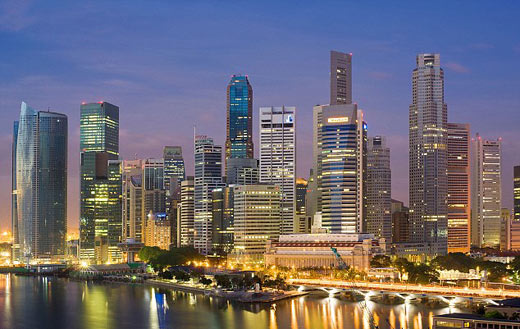|
 Surprising: The people least likely to report positive emotions lived in Singapore, the wealthy and orderly city-state that ranks among the most developed in the world |
|
As the richest country in the world, you'd expect that Qatar would also be the happiest. And you'd also expect Japanese people to be extremely positive, seeing as though they have the highest life expectancy. But clearly wealth and good health do not guarantee happiness after both countries failed to make the top ten most positive countries. The poll of nearly 150,000 people around the world found that seven of the world's 10 countries with the most upbeat attitudes are in Latin America. Gallup asked about 1,000 people in each of 148 countries if they were well-rested, had been treated with respect, smiled or laughed a lot, learned or did something interesting and felt feelings of enjoyment the previous day. In Panama and Paraguay, 85 percent of those polled said yes to all five, putting those countries at the top of the list. They were followed closely by El Salvador, Venezuela, Trinidad and Tobago, Thailand, Guatemala, the Philippines, Ecuador and Costa Rica. The people least likely to report positive emotions lived in Singapore, the wealthy and orderly city-state that ranks among the most developed in the world. Other wealthy countries also sat surprisingly low on the list. Germany and France tied with the poor African state of Somaliland for 47th place. Many of the seven countries which were most positive do poorly in traditional measures of well-being, like Guatemala, a country torn by decades of civil war followed by waves of gang-driven criminality that give it one of the highest homicide rates in the world. Guatemala sits just above Iraq on the United Nations' Human Development Index, a composite of life expectancy, education and per capita income. But it ranks seventh in positive emotions. 'In Guatemala, it's a culture of friendly people who are always smiling,' said Luz Castillo, a 30-year-old surfing instructor. 'Despite all the problems that we're facing, we're surrounded by natural beauty that lets us get away from it all.' The poll shows that prosperous nations can also be deeply unhappy ones. And poverty-stricken ones are often awash in positivity, or at least a close approximation of it. (Agencies) |
你也許會認為卡塔爾作為世界上最富有的國家,幸福感也應該是最強的。 你也許還認為日本人一定非常快樂,考慮到日本人的壽命是全世界最長的。 但顯然財富和健康并不能保證一定會帶來幸福感,因為這兩個國家都未能躋身全球最幸福國家前十名。 這項對全球近15萬人的調查發現,全球最快樂的十個國家中有七個在拉美地區。 蓋洛普民調機構在148個國家中各調查了1000個人,詢問他們是否休息得好、受到尊重,是否笑口常開、學到或從事有趣的事情,是否在過去的一天有快樂的感覺。 在巴拿馬和巴拉圭,85%的被調查者對五個問題都給出了肯定的答案,因而高居榜首。緊隨其后的幸福國家是薩爾瓦多、委內瑞拉、特立尼達和多巴哥、泰國、危地馬拉、菲律賓、厄瓜多爾和哥斯達黎加。 最不容易感到快樂的人生活在新加坡——這個秩序井然的富裕城邦,也是全世界最發達的國家之一。其他富裕國家的排名也出奇的低。德國、法國與非洲的貧困國索馬里蘭一同排在第47位。 幸福感最強的七個國家當中,很多國家按傳統的幸福衡量標準都表現很糟。像危地馬拉這個被數十年內戰搞得四分五裂的國家,戰后因幫派猖獗導致犯罪活動頻發,是全世界謀殺率最高的國家之一。 在聯合國的人類發展指數排名上,危地馬拉排名僅在伊拉克之前,但幸福感卻排在第七位。人類發展指數排名是對壽命、教育和人均收入的綜合排名。 一位30歲的沖浪教練盧茲?卡斯蒂羅說:“在危地馬拉,人們很友好,總是面帶微笑。盡管我們面臨著所有這些問題,但美麗的大自然包圍著我們,讓我們可以逃離一切。” 調查顯示,富裕的國家也可能是非常不快樂的國家。貧困的國家卻經常充滿著幸福感,至少離幸福感很近。 相關閱讀 (中國日報網英語點津 陳丹妮) |
|
Vocabulary: upbeat: 樂觀的,快樂的 awash in: 充滿著,充溢著 |
